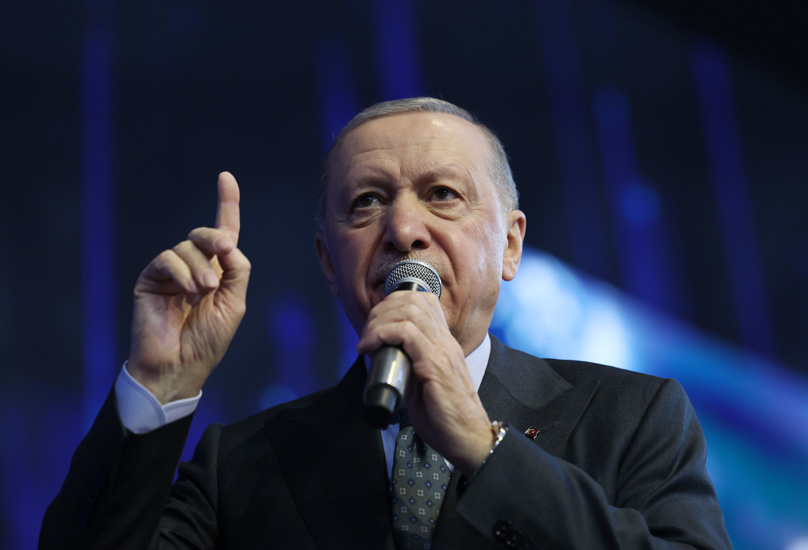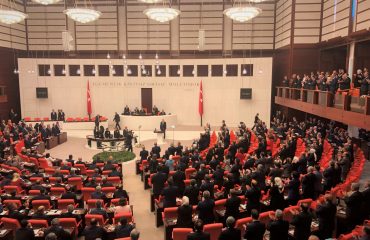

Following the German elections, President Erdoğan stated that liberal democracy in the West has entered a crisis, that the far-right is filling the void, and that the solution lies in Türkiye’s EU membership. (Photo: Presidential Office)
Following a cabinet meeting on February 24, President Tayyip Erdoğan made provocative statements likely to irritate European Union officials already caught between US President Donald Trump and Russian President Vladimir Putin. According to Erdoğan, “liberal democracy, the most captivating ideology of the last century, has entered a serious crisis and impasse.”
He claims the resulting political vacuum is being filled by “far-right demagogues,” arguing that Europe urgently needs a new “lifeline” – and Türkiye is supposedly the remedy.
I can almost hear your objections: that Erdoğan should prioritize rescuing the Turkish economy before presuming to save the EU; that broad segments of Turkish society face increasing oppression under the guise of “strengthening national security”; that the gap between Türkiye and the EU’s political and legal criteria continues to widen; and why should Türkiye take responsibility for rescuing an EU that has kept it in the waiting room for more than sixty years?
However, particularly in the aftermath of Trump’s presidency, as international political and economic dynamics fragment and reconstitute themselves, the asymmetrical dynamics and factors of uneven development compel us to evaluate current conditions beyond conventional frameworks.
It’s particularly important that immediately before Erdoğan’s remarks, Foreign Minister Hakan Fidan stated during a joint press conference with Russian Foreign Minister Sergey Lavrov that membership negotiations with the EU have “frozen” due to the EU’s discomfort with incorporating a large Muslim country into its fold – adding pointedly, “No one admits this openly.”
This context merits closer examination.
Strategic timing
Erdoğan’s statement came immediately after the February 23 German elections, where the far-right gained significant ground and the xenophobic, nationalist AfD became the second-largest party in the Bundestag.
The fact that his remarks contain substantial observations—regardless of whether one agrees with them—suggests this was a calculated statement, waiting for the anticipated German election results to materialize. We should also note Erdoğan’s recent high-level meetings with EU Commission President Ursula von der Leyen on December 17, 2024, and German President Frank-Walter Steinmeier in Ankara on February 5, 2025.
Erdoğan himself emphasized, “Steinmeier’s visit to our country was meaningful,” noting they had “thoroughly discussed” pressing issues two weeks before the pivotal German elections.
European Parliament’s Türkiye Rapporteur Nacho Sanchez Amor told T24’s Cansu Çamlıbel that the sentiment that “there’s nothing left to discuss with Türkiye” is proliferating in Brussels. Yet this claim is contradicted by von der Leyen’s promise in Ankara of an additional €1 billion to stem migration—notably without a single reference to political prisoners or human rights trials.
Similarly revealing is NATO Secretary General Mark Rutte’s recommendation for increased European cooperation with Türkiye’s defense industry.
The crisis of liberal democracy
Setting aside whether Erdoğan’s pronouncements will resonate in Europe, his key observations warrant analysis:
“For some time now, we have been highlighting the alarming rise of anti-immigrant and Islamophobic far-right movements across Western countries, particularly in Europe. Unfortunately, recent electoral outcomes have validated our concerns. Far-right movements have now emerged as the defining political forces across European politics.
“Liberal democracy, once the most alluring ideology of the past century, finds itself in profound crisis and at an impasse. Once touted as a panacea for all societal ills, liberal democracy has lost its former vigor, prestige, and influence.
“As in life, politics abhors a vacuum. The void emerging in European democracies is being filled, as recent elections demonstrate, by far-right demagogues. We must also acknowledge the West’s ambivalent stance toward the 471-day genocide in Gaza. This crisis has decisively revealed that Western values, long presented as global exemplars, lack a genuine commitment to humanity’s common welfare.”
Has this reality been adequately recognized? I remain skeptical, though it’s evident that Western democracies have performed dismally.
The EU’s waning leverage
Against this backdrop, Erdoğan—who emphasizes that Türkiye’s priorities lie in “safeguarding its interests” and ensuring the “far-right resurgence” doesn’t threaten European Turks and Muslims—surprisingly suggests Türkiye-EU relations are improving:
“We value the recent revitalization of our relations with the EU. Developments in Syria, coupled with strategic discussions surrounding the Ukraine conflict, reaffirm Europe’s fundamental dependence on Turkey.
“Only Turkey can extricate the European Union from its current predicament—spanning economic challenges to defense vulnerabilities, political instability to diminished international standing. Moreover, Turkey’s full membership would inject vital dynamism into an aging Europe with its declining demographic and economic outlook. The sooner the EU acknowledges these realities, the more beneficial it will prove for their future.”
Bold assertions indeed. Yet it bears remembering that had the EU not sabotaged Türkiye’s accession process over Cyprus in 2004, both European security architecture and Türkiye’s trajectory toward liberal democracy and economic development would be significantly more robust today.
Through its strategic shortsightedness, the EU has squandered its leverage over Türkiye. With the Ukraine conflict and Trump’s return to power, its global influence continues to deteriorate.
Profound contradictions
We are witnessing an era where Western powers systematically undermine the liberal democratic principles and rule of law they established after the Second World War. This observation was presciently captured at the Munich Security Conference with the concept of “Westlessness”—even before COVID-19 struck Europe. The pandemic subsequently functioned as a brutal equalizer. Following this, the United States and Western Europe’s decision to push Ukraine toward conflict despite clear Russian threats demonstrated the EU’s inability to assert geopolitical influence independent of American military power.
We regularly witness EU member states violating the very Copenhagen Political Criteria they imposed on Türkiye as prerequisites for membership. Core EU nations like Germany, France, and Italy have provided troubling examples of how values-based politics can be readily sacrificed for political and ideological expediency during the Gaza catastrophe. Trump has merely accelerated this shift toward “might makes right” diplomacy. In Türkiye, Erdoğan essentially employs the same cynical calculus by proposing to offset Türkiye’s democratic deficits with its enhanced geopolitical significance.
The ultimate victims are ordinary citizens whose economic security and democratic rights erode, whose voices are systematically suppressed through media censorship and opposition crackdowns.
Ukraine Crisis: Putin’s victory, Europe’s defeat, and Türkiye’s struggle to remain relevant


